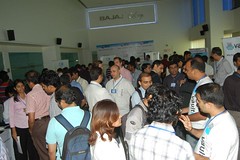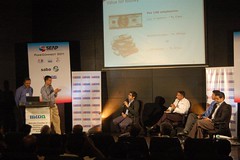PuneTech takes great pleasure in inviting everyone to PuneConnect 2011, to get to know 12 of Pune’s most interesting startups, on 5th November 2011, 12noon-2pm, at MCCIA, ICC Trade Tower, SB Road. (Register here)
PuneConnect 2011 is an event where Pune’s top tech communities (SEAP and PuneTech) and startup communities (POCC and TiEPune) have come together and chosen 12 Pune technology startups from a larger pool of applicants to showcase their product to the tech and startup communities.
The event consists of two parts – a demo room, where all the startups will first be demonstrating their products, followed later by an on-stage session where 4 of the startups will pitch their product to a PuneConnect panel. This panel pitch session will be televised to a national audience on Economic Times’ ETNow channel.
Event Details
11am-12noon: Closed Demo Session
From 11am onwards, all 12 startups will set up demos in Bajaj Gallery, 5th Floor, A Wing, MCCIA, ICC Trade Tower. This is a closed session that is open only to members of SEAP and charter members of TiE Pune; this is intended to allow intimate discussion between Pune’s tech startups, and senior members of Pune’s more established software startups. If you are not a member of SEAP or a charter member of TiE Pune, but would like to attend this session and you’re a CXO or MD of an established software company or an investor, please write to puneconnect@punetech.com with a little background about yourself to request an invitation.
12noon-12:30pm: Open Demo Session
From 12noon onwards, we’ll open the demo room (Bajaj Gallery, 5th Floor, A Wing, MCCIA, ICC Trade Tower) for everybody. The bottom of this article gives an overview of the companies that will be present.
12:30pm-2pm: PuneConnect-ETNow Session
4 selected companies will pitch their product to a distinguished panel followed by Q&A with the panelists, in a session that will be televised on Economic Times’ ETNow channel. This session will happen in the Sumant Moolgaokar Auditorium (Ground Floor of the same building, A Wing, ICC Trade Tower), and is open to all subject to availability of seats (on a first-come-first-served basis).
Registration and Fees
This event is open to all after 12noon, and is free. Please register here
The Startups
The following is the list of 12 chosen startups in alphabetical order. These were selected from amongst the startups that applied to PuneConnect, by a panel of selectors from SEAP. The following selection criteria were used:
- Is the vision of the startup clear?
- Do they have a differentiation and is the potential market correctly identified? In other words, can they make a valid business out of it?
- Do they have a novel idea or IP that is hard to replicate? i.e. Sustained competitive advantage.
Note: PuneTech and POCC did NOT play any part in the selection, due to potential conflicts of interest. See the bottom of this article for details.
AdMogul
The AdMogul is a social (Facebook) game built around the concept of TV commercials which rewards and encourages people to rate commercials from a pool of choices from a particular campaign. (For example, Cadbury’s recent Diwali Campaigns). When people rate commercials, they capture basic demographic details which help us generate insights which can help advertisers refine and re-target their commercials.
The AdMogul is started by Saurabh Jain (BE Computer Science from UoP) and Gaurang Sinha (BE Computer Engineering UoP) in November 2010, and the game was launched in August 2011. This is their second startup.
Link: http://intellista.com/#/what-we-do/the-admogul
ApplyEzee
ApplyEzee.com is a platform for students to apply to a large number of educational institutes across the globe via a common application form. It makes finding institutes much simpler, with easy-to-use tools that quickly let you find institutions and finally applying to them via the common application form. The Institution Eligibility Calculator that instantly tells you your chances of getting into your favorite institutions Institutions Profiles for 1,000+ institutions.
ApplyEzee has been started by Himanshu Jain and Sanjay Kumar, entrepreneurial sales and marketing strategists with over 40 years of composite experience in the domain of education & training having a record of demonstrated success in driving multi-crore sales.
Link: http://applyezee.com
BizPorto
BizPorto provides an Internet based business-to-business (B2B) marketplace where business buyers (outsourcers, wholesalers) can find and buy b2b goods from sellers (manufacturers, suppliers). Customers are both the sellers and the buyers, typically from the medium and small scale industries, who create online stores through the BizPorto website & advertise their products or needs. BizPorto has operations in 6 different cities in Maharashtra and Karnataka.
BizPorto is founded by Suresh Salunkhe, who has 10+ years of experience in MSME sector.
Link: http://bizporto.com
CoTrakr
CoTrakr is a platform that allows organizations to collect and use the collective knowledge of their employees, customers, and partners by leveraging open innovation techniques. This allows organizations to discover new ideas, business opportunities, locate subject matter experts and utilize their expertise in taking an idea from concept to cash.
CoTrakr has been founded by Abhijeet Dhamankar who has 10 years of IT experience in knowledge management and information architecture.
Link: http://cotrakr.com
Deja VU 3D
“DejaVu 3d” is an image processing service, that works with its channel partners to process and convert 2d photographs to 3d that can be viewed as print or digital content without the need of expensive electronic hardware. The resultant 3D content would not require any special screen, viewing device or glasses. DejaVu 3D will tie up with event photographers to create 3D images, promote 3D services across the country, and in general become a technology processing and marketing company with future ventures in Realtime 2D to 3D video conversion and glasses free 3D.
Deja Vu 3D is founded by Krunnal Gharre (MBA Thunderbird, BE E&TC UoP), who has 5 years of experience in operations, sales and marketing in US and India. Customers: TATA, Kirloskar, PARI, Warade Automation, Accurate Gauges, Arrow MachineTools, PCMC, Patsons, Surya, Aurora Towers, Ashtekar Jewelers, Fine Equipments. Also winner of Times of India’s Power of Ideas Program in 2010.
Link: http://www.wix.com/krunnal/dejavu3d
DroidCloud
DroidCloud allows users to try and use Android apps from any desktop web browser. Normally, applications intended for Android phones cannot be used by people who do not have an Android phone. DroidCloud gives every user a virtual Android phone in the cloud that they can use to run apps. This is useful for app developers to demo apps to clients, app publishers to show demo of apps to potential customers and users, and different teams in large organizations to collaborate on apps.
DroidCloud is founded by Aniket Awati, who has experience building many mobile apps for many different platforms and Ratnadeep Deshmane who is an avid code enthusiast who has developed complex back-ends for intelligent education service applications.
Link: http://rainingclouds.com
InnovizeTech
InnovizeTech’s Sapeince is a software product that when installed on employee PCs automatically figures out what work was done, by whome, for how long, and for what purpose. It produces reports that highlights gaps and deviations from pre-determined goals. The basic idea is to provide managers with data that can be used to drive efficiencies, detect underutilization, and compare with industry metrics. Sapeince protects privacy of individual employees by only providing aggregate data and trends for teams > 10 employees in most cases.
Innovize has been founded by Shirish Deodhar, Madhukar Bhatia, Swati Deodhar, Hemant Joshi – Each has 25+ years of technology and leadership experience in US and India. They are Serial Entrepreneurs with 2 previous successes in outsourced product development.
Link: http://innovizetech.com
IntouchId
IntouchId is a cloud and mobile based solution that allows people and businesses to securely maintain and share their contact information. Just update your contact info in one place and all your contacts’ automatically see the updates in their address books. Conversely, your address book is always up-to-date since it is being managed by the contacts themselves. The auto updating address book is always at your fingertips – visible directly in your mobile’s native phonebook. IntouchId brings these benefits to the corporates by providing an auto updating corporate directory accessible to employees and customers alike, ensuring you stay in touch with your customers, forever.
IntouchId is founded by Dr. Sarang Lakare (PhD in Computer Science from SUNY Stony Brook, USA). Previously he has worked in the areas of medical imaging analysis software and helped built the world’s first Virtual Colonoscopy device, and led the development of software for automatic cancer detection.
Link: http://www.theintouchid.com/
kPoint
kPoint is a cloud-based solution for aglie knowledge transfers based on innovative video search technology backed by 5 pending patents. It is basically a browser based software system that allows customers to create interactive videos that embed slides and other data that makes them easier to search and browse than regular videos. This can be used by enterprises to facilitate knowledge capture and collaborative learning. It can be used by product managers, team members, subject matter experts, trainers, and support.
kPoint is led by a team of 5 experienced industry veterans (including Shridhar Shukla and Sunil Gaitonde, founders of GS Lab) with repeated technology business successes, with seed investment by GS Lab, and now self-funded.
Link: http://kpoint.in
ReliScore
ReliScore.com is an interactive web portal that enables job-seekers to showcase their technology skills across various domains. Users of the portal solve problems and upload sample programs. This allows companies to search for the right candidate based on actual competencies and examples of work.
ReliScore is founded by Navin Kabra (PhD in CS, University of Wisconsin, USA, B.Tech IIT Bombay) and Amit Paranjape (MS University of Wisconson, USA, B.Tech. IIT Bombay) who each have 15+ years of software industry experience in the US and India – in large companies and in startups.
Link: http://reliscore.com
Vaultize
Vaultize is a cloud-based backup solution for enterprises. It is built ground up specifically for the cloud, with enterprise class SLAs and features, data de-duplication and encryption at source, and with clear return on investment in mind. Target customers are SMBs/SMEs/Enterprises – for files, emails, app databases on laptops, desktops and servers.
Vaultize is founded by Anand Kekre (MTech CSE IIT Bombay, BE CSE SGSITS Indore) who has 17 years of experience in large software enterprises, and 53 US Patents, and Ankur Panchbudhe (MTech CSE IIT Bombay, B.E. CSE VNIT Nagpur) who has 10 years of experience in large software enterprises, and 17 US Patents.
Link: http://vaultize.com
World Without Me
World Without Me is a website that allows people to create a digital “afterlife” so that they can store their web passwords in a vault to be bequeathed to heirs after death, send messages in the future, create an autobiography on the go by archiving and curating social networks, and create private discussions. In the future, they would be able to offer country specific estate planning tools, and mentoring and coaching for life challenges.
World without me is founded by Bhaskar Thakur, a seasoned marketer and entrepreneur with over 13 years of experience. Bhaskar was one of the first wave of Internet Marketers in India and specializes in creating strategies, solutions and platforms for the Social Web.
Link: https://www.worldwithoutme.com/
(Disclaimer: Navin and Amit of PuneTech were deeply involved in the creation, conceptualization and organization of PuneConnect, and are also the founders of ReliScore one of the companies that had applied for PuneConnect. Due to the potential conflict of interest, Navin and Amit did not play any part in the selection process which was done entirely by SEAP. For similar reasons, non of members of POCC who are in the PuneConnect organizers team played any part in the selection.)

